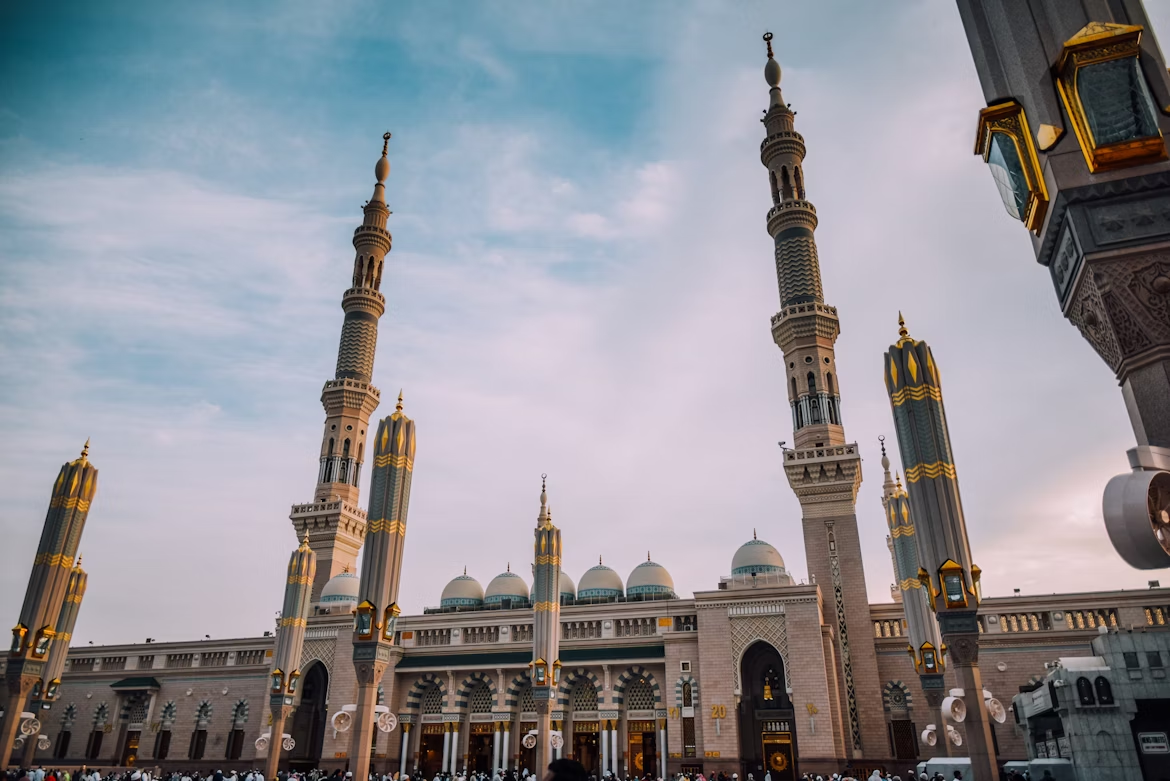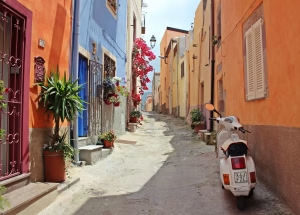Saudi Arabia, a land of timeless deserts and vibrant souks, offers a shopping experience that bridges ancient traditions and contemporary luxury. Whether you’re wandering through the historic alleys of Jeddah or exploring glittering malls in Riyadh, the Kingdom presents countless treasures — from aromatic oud and handwoven carpets to intricate gold jewelry and rare dates.
In this ultimate guide to things to buy in Saudi Arabia, we reveal 25 popular souvenirs and must-buy items that capture the culture, craftsmanship, and spirit of the Arabian Peninsula.
- 1. Oud Perfume (Traditional Fragrance)
- 2. Saudi Dates (Ajwa, Medjool, Sukari)
- 3. Gold Jewelry & Bedouin-Inspired Designs
- 4. Miswak (Natural Toothbrush)
- 5. Traditional Arabian Coffee Sets
- 6. Dallah (Arabic Coffee Pot)
- 7. Mabkhara (Incense Burner)
- 8. Incense (Bukhoor & Frankincense)
- 9. Abaya & Traditional Clothing
- 10. Arabic Calligraphy Art
- 11. Saudi Spices & Spice Mixes (Baharat, Kabsa Blend)
- 12. Camel Milk Products (Chocolate, Soaps, Skincare)
- 13. Sand Art Bottles
- 14. Islamic Prayer Beads (Misbaha)
- 15. Holy Quran & Islamic Books (Decorative Editions)
- 16. Arabian Carpets & Rugs
- 17. Khawlani Coffee Beans
- 18. Decorative Brassware & Daggers
- 19. Local Honey (Sidr, Samar)
- 20. Handmade Pottery & Ceramics
- 21. Ardha Swords (Decorative)
- 22. Dates Syrup & Date Paste
- 23. Traditional Headdresses (Shemagh, Ghutra)
- 24. Saudi Tea & Herbal Blends
- 25. Souvenir Magnets & Miniature Mosques
- Why Choose OneVasco?
- FAQs
1. Oud Perfume (Traditional Fragrance)
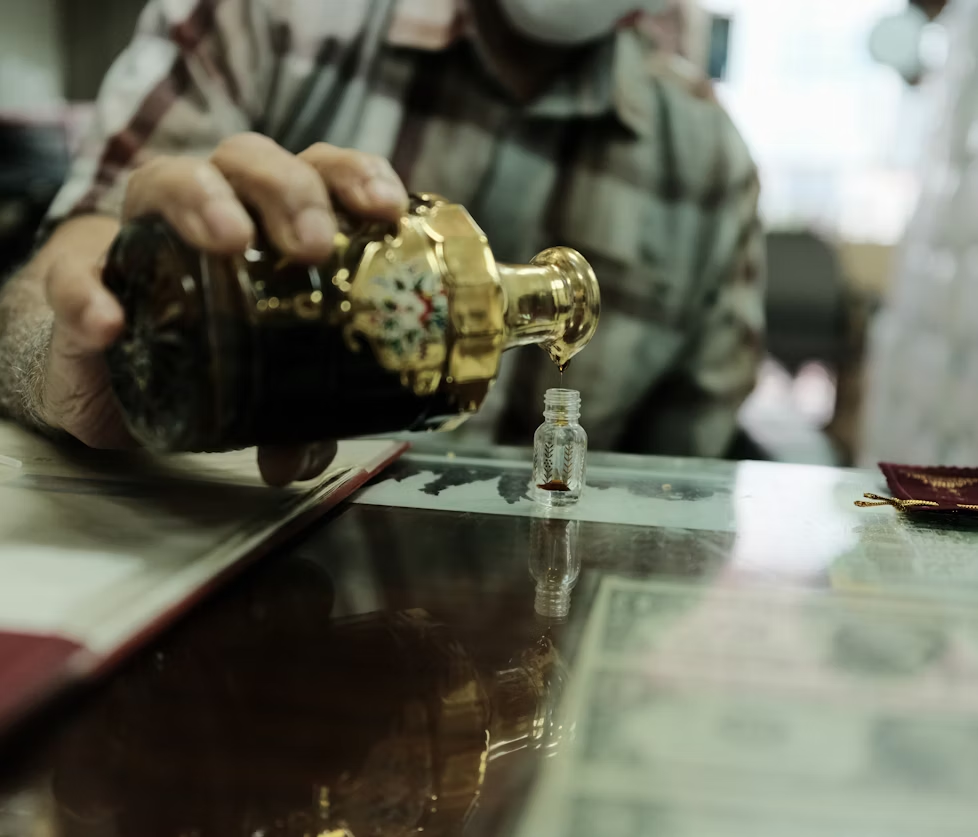
Oud, often referred to as “liquid gold,” is one of the most iconic items to purchase in Saudi Arabia. Extracted from agarwood, oud perfume carries a warm, rich, woody scent that’s deeply embedded in Arabian culture and used for special occasions, religious rituals, and daily wear. Its long-lasting aroma and rarity make oud a prized possession among fragrance connoisseurs around the world.
Why Saudi Arabia: The Kingdom is a global hub for oud, offering some of the purest and most refined variations found anywhere in the world.
Where to Buy:
- Arabian Oud (Nationwide)
- Abdul Samad Al Qurashi stores (Riyadh, Jeddah, Makkah)
- Local perfume shops in Taiba Market (Madinah)
Price Range: SAR 150 to SAR 2,500+ (₹3,400 to ₹56,000)
Authenticity Identification: Check for reputable brands like Arabian Oud or Abdul Samad Al Qurashi; ensure bottles mention “100% pure oud” or “Dehn Al Oud.”
Pro Tip: Test on skin and wait 10 minutes; pure oud evolves over time.
Suggested Read: Book a Visa Appointment for Saudi Arabia
2. Saudi Dates (Ajwa, Medjool, Sukari)
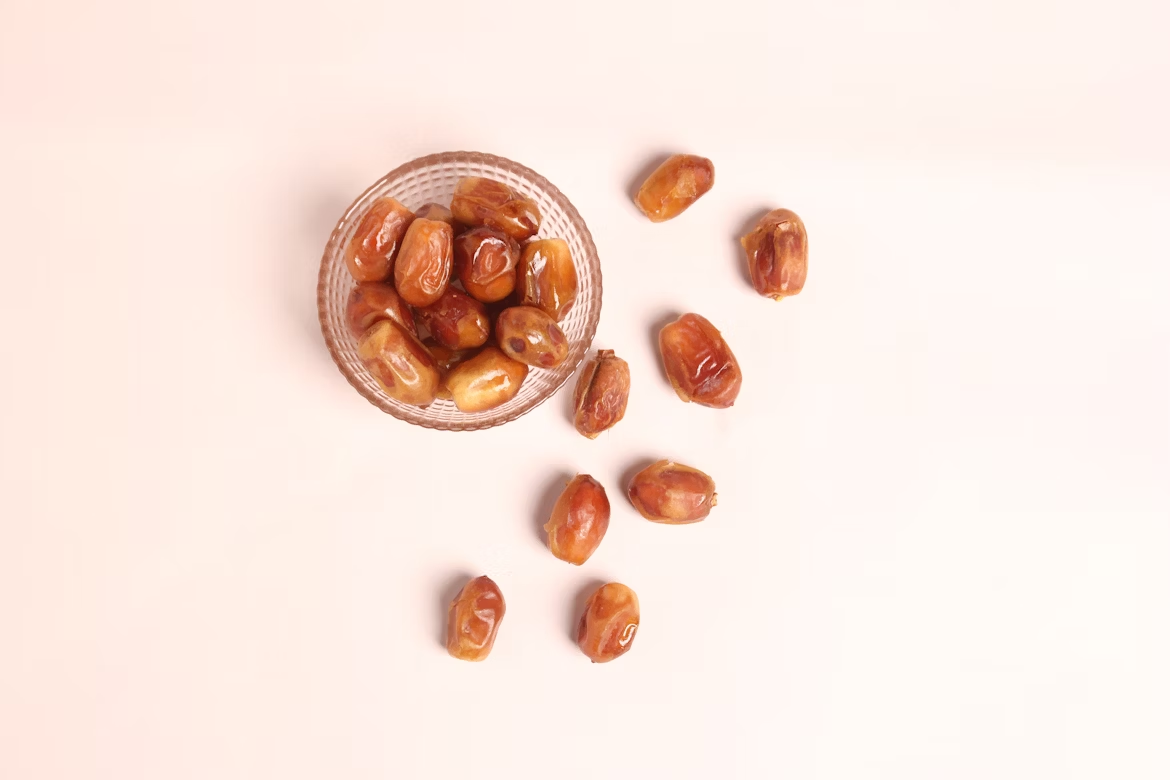
Dates are a cherished part of Saudi hospitality and heritage. Ajwa dates from Madinah are especially prized for their religious significance and health benefits, while Medjool and Sukari varieties are known for their sweetness and texture. These nutrient-rich fruits are often gifted during religious festivals and make for meaningful, delicious souvenirs.
Why Saudi Arabia: The Kingdom is one of the largest producers of premium dates, offering unmatched freshness and variety.
Where to Buy:
- Al Madinah Date Market
- Tamimi and Danube Supermarkets
- Bateel Boutiques (luxury date packaging)
Price Range: SAR 20 to SAR 150/kg (₹450 to ₹3,400/kg)
Authenticity Identification: Look for dates labeled with origin (e.g., “Ajwa from Madinah”). Premium dates often come in vacuum-sealed packs or gift boxes from brands like Bateel
Pro Tip: Choose vacuum-sealed or gift boxes for freshness and travel ease.
Suggested Read: Check Saudi Arabia Visa Status In India
3. Gold Jewelry & Bedouin-Inspired Designs

Gold holds deep cultural and economic value in Saudi Arabia. From simple bangles to elaborate Bedouin designs, jewelry here is often sold by weight and boasts high purity, usually 21k or 22k. It’s a popular investment and a timeless souvenir, blending craftsmanship with traditional Arabian elegance.
Why Saudi Arabia: Tax-free gold, excellent craftsmanship, and better value than many global markets.
Where to Buy:
- Gold Souk (Riyadh, Jeddah)
- Al Yamama Gold Market (Dammam)
- Taiba Gold Souk (Makkah)
Price Range: SAR 500 to SAR 10,000+ (₹11,000 to ₹225,000+)
Authenticity Identification: Check gold purity stamps (21k or 22k), request a weight-based price receipt, and buy from licensed souks with certified scales
Pro Tip: Check the daily gold rate and always ask for a weight receipt.
Suggested Read: Famous Foods in Saudi Arabia
4. Miswak (Natural Toothbrush)
Miswak is a natural toothbrush made from the Salvadora persica tree, used for centuries across the Islamic world. Its antibacterial properties and portability make it a sustainable and spiritual souvenir. Favored by the Prophet Muhammad, miswak holds both religious significance and proven dental health benefits, and thus is considered one of the best local products in Saudi Arabia.
Why Saudi Arabia: Widely used for religious reasons, especially before prayer and during Ramadan.
Where to Buy:
- Pharmacies across Saudi Arabia
- Souvenir shops in Makkah and Madinah
- Local herbal stalls in souks
Price Range: SAR 2 to SAR 10 per stick (₹45 to ₹225)
Authenticity Identification: Choose sticks labeled with the tree species (Salvadora persica) and sealed for hygiene. Fresh miswak should be flexible and slightly aromatic
Pro Tip: Buy sealed packs labeled “Salvadora persica” for hygiene.
5. Traditional Arabian Coffee Sets

Gahwa (Saudi coffee) is traditionally served in small, handleless cups with dates, and it serves as one of the best traditional souvenirs in Saudi Arabia. A traditional coffee set includes a dallah (pot), small finjan cups, and often a serving tray. It plays a central role in Saudi hospitality rituals, especially during family gatherings and formal visits.
Why Saudi Arabia: Coffee is an essential part of hospitality culture; sets are designed with regional flair.
Where to Buy:
- Souks in Riyadh and Al Hofuf
- Saco Home Stores (modern styles)
- Al-Zal Market (Riyadh)
Price Range: SAR 100 to SAR 600+ (₹2,200 to ₹13,500)
Authenticity Identification: Authentic sets are usually handcrafted, with brass or silver detailing. Look for regional motifs and check for heat-safe interiors if functional
Pro Tip: Pair with gahwa packets for a complete gift.
6. Dallah (Arabic Coffee Pot)

The dallah is an iconic symbol of Saudi hospitality and is used to brew and pour gahwa (Arabic coffee). Its elegant, curved design and cultural significance make it a beautiful keepsake or decorative item. Often displayed in homes and offices, the Dallah represents warmth, tradition, and national pride.
Why Saudi Arabia: The Dallah is a national cultural emblem and featured on Saudi currency and monuments.
Where to Buy:
- Al-Zal Market (Riyadh)
- Souqs in Al Qassim and Jeddah
- Heritage gift shops at the National Museum of Saudi Arabia
Price Range: SAR 80 to SAR 500+ (₹1,800 to ₹11,000)
Authenticity Identification: Check for handmade metalwork and traditional engravings. Older styles may be heavier with a spout lid; ensure it’s labeled as Saudi-made
Pro Tip: Ask if it’s heat-safe before using for brewing.
Suggested Read: Best Markets in Saudi Arabia
7. Mabkhara (Incense Burner)

The mabkhara is a decorative incense burner used to hold bukhoor — aromatic wood chips infused with oils. Common in Saudi homes, they’re used for special occasions, prayer times, or to welcome guests. Its fragrant smoke is believed to purify spaces and create a warm, inviting atmosphere.
Why Saudi Arabia: The ritual of burning incense is deeply tied to Saudi Arabian hospitality and tradition.
Where to Buy:
- Traditional souks (Riyadh, Jeddah, Abha)
- Perfume shops like Arabian Oud
- Museum gift shops and heritage centers
Price Range: SAR 30 to SAR 300+ (₹700 to ₹6,700)
Authenticity Identification: Genuine mabkharas are often ceramic, brass, or wood with hand-painted or engraved patterns. Avoid mass-produced plastic versions
Pro Tip: Choose ceramic or brass; avoid plastic replicas.
Suggested Read: Is Saudi Arabia Safe to Visit?
8. Incense (Bukhoor & Frankincense)
Bukhoor refers to scented wood chips soaked in oud oil or other fragrances. Frankincense, sourced from southern Saudi Arabia, is another aromatic resin widely burned during religious or family gatherings. These traditional scents are cherished for their calming effects and are often used to honor guests or mark spiritual moments.
Why Saudi Arabia: The region is a historic center of incense trade, especially from Dhofar and Najran.
Where to Buy:
- Incense shops in souks across the country
- Al Qurashi and Arabian Oud stores
- Asir and Najran specialty stalls
Price Range: SAR 50 to SAR 500+ (₹1,100 to ₹11,000)
Authenticity Identification: High-quality bukhoor feels slightly oily and comes in wooden chip form, not powder. Frankincense resin should be hard, amber-like, and aromatic when burned
Pro Tip: Test scent on hot coal; good bukhoor smokes slowly.
9. Abaya & Traditional Clothing
The abaya, a long flowing black cloak worn by Saudi women, has evolved from a traditional garment into a fashion statement. Modern abayas feature embroidery, colorful trims, and designer influences. Whether classic or contemporary, the abaya reflects both modesty and the Kingdom’s evolving sense of style.
Why Saudi Arabia: It’s a national garment with cultural importance, available in both traditional and designer styles.
Where to Buy:
- Riyadh Gallery Mall
- Souq Al Alawi (Jeddah)
- Specialized abaya boutiques (like Nora Al Shaikh or Hia Magazine-featured designers)
Price Range: SAR 100 to SAR 1,500+ (₹2,200 to ₹33,000)
Authenticity Identification: Check labels for local designers or Saudi brands. High-quality abayas use flowing fabrics like chiffon, crepe, or silk with neat embroidery
Pro Tip: Look for breathable fabrics and stitched details, not glued.
10. Arabic Calligraphy Art
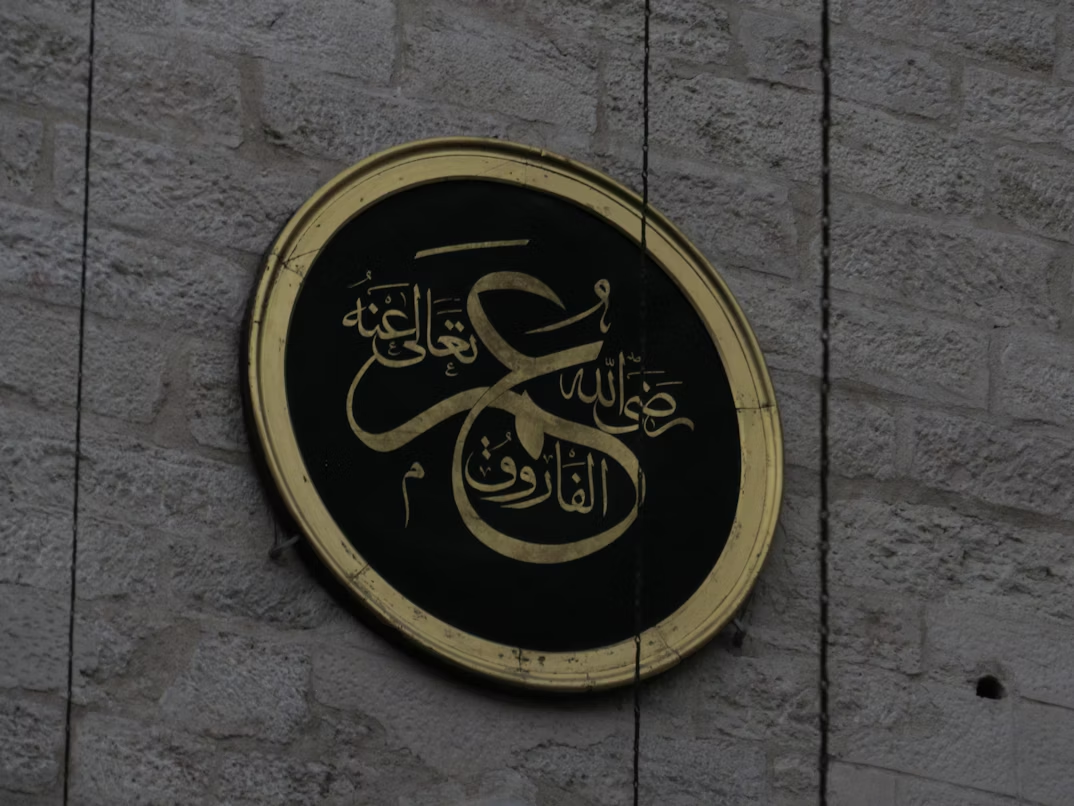
Arabic calligraphy is considered a spiritual art form in the Islamic world. From Quranic verses to poetic phrases, these hand-lettered artworks make meaningful home décor or unique gifts to buy in Saudi Arabia. Each piece showcases the beauty of the Arabic script, blending artistic expression with cultural and religious depth.
Why Saudi Arabia: Home to revered calligraphers and Islamic art galleries, Saudi Arabia celebrates calligraphy as a sacred heritage.
Where to Buy:
- Islamic Arts Biennale stores (Jeddah)
- Souqs near Al-Masjid an-Nabawi (Madinah)
- Online galleries or artisan booths at cultural festivals
Price Range: SAR 100 to SAR 1,000+ (₹2,200 to ₹22,500)
Authenticity Identification: Authentic pieces are usually signed by the artist and use canvas, wood, or high-quality paper
Pro Tip: Pick signed artworks on canvas or wood for authenticity.
11. Saudi Spices & Spice Mixes (Baharat, Kabsa Blend)

Saudi cuisine is rich with aromatic spices — from the warm, earthy tones of baharat (seven-spice mix) to the signature kabsa blend used in Saudi Arabia’s national rice dish. These spice mixes make excellent culinary souvenirs. Bringing home these spices lets you recreate authentic Saudi flavors in your own kitchen.
Why Saudi Arabia: Locally blended spices offer authentic flavors of the Arabian Peninsula and are hard to replicate abroad.
Where to Buy:
- Al-Zal Market (Riyadh)
- Traditional souks in Al Qassim or Jeddah
- Supermarkets like Tamimi and Danube
Price Range: SAR 10 to SAR 100+ (₹225 to ₹2,200)
Authenticity Identification: Look for blends sold in transparent jars or freshly scooped at local souks for freshness
Pro Tip: Buy fresh, loose blends from spice stalls for aroma.
Suggested Read: Beaches in Saudi Arabia
12. Camel Milk Products (Chocolate, Soaps, Skincare)

Camel milk is a staple in Bedouin tradition and is known for its high nutritional value and low lactose content. In recent years, camel milk-based chocolates, soaps, and skincare products have become popular among health-conscious travelers. These unique products offer a taste of desert wellness, blending tradition with modern health trends.
Why Saudi Arabia: As a country with a strong Bedouin heritage, Saudi Arabia produces some of the world’s finest camel milk products.
Where to Buy:
- Camelicious (available at airports and malls)
- Al-Nakhla stores
- Organic and herbal shops in Riyadh or Jeddah
Price Range: SAR 15 to SAR 100+ (₹340 to ₹2,200)
Authenticity Identification: Check ingredient lists for “camel milk” as a primary component. Certified brands like Camelicious offer expiry dates and production details.
Pro Tip: Check expiry and refrigerate chocolates during warm months.
13. Sand Art Bottles

These eye-catching souvenirs are made by layering colored sand into glass bottles to depict desert scenes, camels, and palm trees, often personalized with names or messages. They’re a fun and artistic reminder of Saudi Arabia’s landscapes. Handcrafted by local artisans, each sand art bottle captures a miniature snapshot of the Kingdom’s natural beauty.
Why Saudi Arabia: Local artisans craft these using natural desert sand and centuries-old techniques.
Where to Buy:
- Tourist souks in Riyadh, Al Ula, and Jeddah
- Al-Balad District (Jeddah)
- Roadside stalls near the desert tours
Price Range: SAR 20 to SAR 150 (₹450 to ₹3,400)
Authenticity Identification: Look for hand-signed or custom-made bottles. The sand art should not shift or fall apart when tilted; check for tightly sealed tops.
Pro Tip: Shake gently; real ones stay intact when tilted.
Suggested Read: Top Shopping Malls in Saudi Arabia
14. Islamic Prayer Beads (Misbaha)

Misbaha, or prayer beads, are used by Muslims to count recitations and are deeply spiritual keepsakes. They come in a range of materials — from wood and glass to precious stones and amber. Often gifted after pilgrimages, misbahas symbolize faith, reflection, and spiritual connection.
Why Saudi Arabia: A highly spiritual country, Saudi Arabia offers beautifully crafted misbaha near holy sites and mosques.
Where to Buy:
- Souqs near Masjid al-Haram (Makkah) or Masjid an-Nabawi (Madinah)
- Religious gift stores
- Airport Islamic shops
Price Range: SAR 10 to SAR 300+ (₹225 to ₹6,700)
Authenticity Identification: Authentic misbahas are smooth to the touch, well-knotted, and made from real materials like sandalwood, amber, or polished stone. Count the beads (usually 33 or 99).
Pro Tip: Choose real wood or stone and ensure the bead count is correct.
15. Holy Quran & Islamic Books (Decorative Editions)

Purchasing a Holy Quran from Saudi Arabia, especially from Makkah or Madinah, is a deeply meaningful souvenir for Muslim travelers. Many editions feature gold embossing, artistic covers, and English translations. These beautifully crafted books serve as both spiritual guides and treasured reminders of a sacred journey.
Why Saudi Arabia: The Quran is central to the Islamic faith, and the Kingdom produces high-quality, respected editions.
Where to Buy:
- Islamic bookstores near the Prophet’s Mosque (Madinah)
- King Fahd Complex for the Printing of the Holy Quran
- Religious shops in major malls
Price Range: SAR 50 to SAR 500+ (₹1,100 to ₹11,000)
Authenticity Identification: Look for embossed covers, a seal of authenticity, and official publishers like the King Fahd Complex
Pro Tip: Go for gold-embossed covers with certified translations
Suggested Read: Exploring Saudi Arabia Monuments
16. Arabian Carpets & Rugs

Arabian carpets are not just floor coverings — they’re rich tapestries of culture and history, and are the best handmade items from Saudi Arabia. From geometric tribal designs to luxurious woven silk blends, these carpets are prized for their quality and beauty. Owning one connects you to centuries of Bedouin craftsmanship and traditional Arabian storytelling through design.
Why Saudi Arabia: The Kingdom offers a variety of regional rugs, including Najdi, Bedouin, and Hijazi styles that reflect local heritage.
Where to Buy:
- Al-Qaisariya Souq (Al-Hofuf)
- Souq Okaz (Taif)
- Carpet dealers in Riyadh or Jeddah
Price Range: SAR 300 to SAR 5,000+ (₹6,700 to ₹1,12,000+)
Authenticity Identification: Handmade rugs feel uneven underneath and have intricate knots on the backside. Ask for details on origin and materials used (e.g., wool or silk).
Pro Tip: Flip the rug; uneven knots mean it’s handmade.
17. Khawlani Coffee Beans

Grown in the misty mountains of Jazan, Khawlani coffee beans are a UNESCO-recognized heritage product. With a mild, citrusy flavor, they’re considered among the finest Arabica beans in the Middle East. Every cup brewed from these beans offers a taste of Saudi Arabia’s southern highlands and its ancient coffee legacy.
Why Saudi Arabia: Jazan’s Khawlani farms are part of centuries-old coffee-growing traditions linked to ancient trade routes.
Where to Buy:
- Jazan local markets
- Select Carrefour and Danube stores
- Specialty coffee shops in Riyadh or Jeddah
Price Range: SAR 50 to SAR 200/kg (₹1,100 to ₹4,500/kg)
Authenticity Identification: Beans should be dry but not brittle, uniform in size, and labeled with “Khawlani” or origin like “Jazan.”
Pro Tip: Light roast? Look for pale, citrusy beans labeled “Jazan.”
Suggested Read: Historical Places in Saudi Arabia
18. Decorative Brassware & Daggers

From intricately engraved coffee pots to curved ceremonial daggers known as janbiya, Saudi brassware reflects tribal artistry. These symbolic items are often gifted or displayed in homes. Each piece tells a story of heritage, valor, and the enduring beauty of Arabian metalwork.
Why Saudi Arabia: Historically used in weddings and rituals, janbiya and brass items are still crafted in traditional ways, especially in the south.
Where to Buy:
- Souq Al-Sagha (Najran)
- Cultural markets in Abha and Asir
- Riyadh’s National Museum gift shop
Price Range: SAR 100 to SAR 1,500+ (₹2,200 to ₹33,000+)
Authenticity Identification: Authentic items have visible hand-tool marks and weighty metal. Brass often has a matte finish with minor imperfections that signal craftsmanship.
Pro Tip: Weight and tool marks signal handmade quality.
Suggested Read: Festivals in Saudi Arabia
19. Local Honey (Sidr, Samar)

Saudi Arabia produces some of the most sought-after raw honey in the world, especially from Sidr trees in the mountainous regions of Asir and Al-Baha. These honeys are known for their healing properties and rich flavor. Locally harvested and minimally processed, Saudi honey is a golden gift steeped in nature and tradition.
Why Saudi Arabia: Pure Sidr honey is a prized traditional remedy, often used for immune support and wound healing.
Where to Buy:
- Local apiaries in Abha and Al-Baha
- Honey shops in Riyadh’s Al Owais market
- Souqs and festivals like Janadriyah
Price Range: SAR 80 to SAR 500+ per jar (₹1,800 to ₹11,000)
Authenticity Identification: Genuine honey is thick, slowly dripping, and labeled with the floral source (e.g., Sidr). Certified bottles often come with traceability QR codes.
Pro Tip: Real Sidr honey flows slowly and stays thick in heat.
20. Handmade Pottery & Ceramics

Saudi pottery reflects the ancient skills of desert craftsmanship, with each region offering distinctive shapes and designs. Items range from functional water jars to decorative plates and bowls. These local crafts and art in Saudi Arabia carry the spirit of the desert, shaped by hand and fired with cultural pride.
Why Saudi Arabia: Traditional pottery is still produced using techniques passed down for generations, especially in the Najran and Al-Qassim regions.
Where to Buy:
- Najran pottery markets
- Heritage villages in Al-Qassim
- Craft sections of the Janadriyah Festival (Riyadh)
Price Range: SAR 30 to SAR 400+ (₹700 to ₹9,000)
Authenticity Identification: Pottery should show natural glaze variations or minor imperfections. Look for artisan marks, regional symbols, or stamps on the base.
Pro Tip: Natural glaze cracks or marks are signs of authenticity.
21. Ardha Swords (Decorative)

The Ardha sword is an iconic symbol of Saudi heritage, often seen in the national dance performed during festivals and royal ceremonies. These decorative swords are typically adorned with engravings and silver detailing. Owning one is like holding a piece of Saudi pride — a tribute to valor, unity, and tradition.
Why Saudi Arabia: The Ardha is deeply rooted in tribal history and national pride, particularly in the Najd region.
Where to Buy:
- Heritage shops in Riyadh and Najran
- Janadriyah Festival (Riyadh)
- Museum gift stores and souks
Price Range: SAR 200 to SAR 2,000+ (₹4,500 to ₹45,000)
Authenticity Identification: Look for engraved blades, ornate sheaths, and Arabic calligraphy. Genuine versions often include a certificate of origin or are hand-forged.
Pro Tip: You can ask for a display stand.
22. Dates Syrup & Date Paste

Beyond fresh dates, Saudi Arabia also produces high-quality date syrup and paste — used in desserts, smoothies, and traditional dishes. These are nutrient-rich alternatives to processed sugar. Their deep, caramel-like flavor brings a wholesome touch of Saudi sweetness to any recipe.
Why Saudi Arabia: The Kingdom is a leading innovator in date-based products, offering high-grade syrups for both culinary and medicinal use.
Where to Buy:
- Date markets in Madinah or Qassim
- Bateel stores (premium products)
- Local supermarkets (Tamimi, Panda)
Price Range: SAR 20 to SAR 100+ (₹450 to ₹2,200)
Authenticity Identification: Ensure it’s made with 100% date extract, with no added sugar or glucose syrup. Authentic syrups are thick, glossy, and rich in color.
Pro Tip: For the richest flavor, opt for dark, thick varieties made from Saudi-grown dates like Sukari or Khudri.
23. Traditional Headdresses (Shemagh, Ghutra)
The shemagh (red and white checkered) and ghutra (plain white) are traditional head coverings worn by Saudi men. Paired with an agal (black rope band), they make stylish and authentic souvenirs. Wearing one offers a timeless connection to Saudi identity, Bedouin heritage, and Arabian elegance.
Why Saudi Arabia: These headdresses are more than attire — they represent tradition, identity, and pride.
Where to Buy:
- Souqs across Riyadh and Jeddah
- Tailor shops and men’s boutiques
- Al Owais Market (Riyadh)
Price Range: SAR 30 to SAR 300+ (₹700 to ₹6,700)
Authenticity Identification: Check fabric labels for 100% cotton or high-thread-count blends. Popular brands include Al Bassam, and authentic sets come with a boxed agal.
Pro Tip: Cotton ones are more breathable and hold shape better.
24. Saudi Tea & Herbal Blends

Saudi Arabia has a strong tea culture, especially herbal teas made with cardamom, mint, or anise. Served after meals or during gatherings, these blends are both soothing and flavorful. Sipping these fragrant infusions is a calming ritual that reflects the Kingdom’s warm hospitality and wellness traditions.
Why Saudi Arabia: Herbal teas are integral to Saudi hospitality and wellness practices.
Where to Buy:
- Herbal shops in local souqs
- Tea vendors in Al Qassim and Al Baha
- Gourmet sections in major supermarkets
Price Range: SAR 10 to SAR 80+ (₹225 to ₹1,800)
Authenticity Identification: Blends should include visible herbs or whole spices, not just flavored powder. Packaging often includes brewing instructions and origin labels.
Pro Tip: Buy loose leaves, not tea dust, for better flavor.
25. Souvenir Magnets & Miniature Mosques
No shopping trip is complete without classic souvenirs like magnets, keychains, and miniature models of famous Saudi landmarks. These make easy-to-carry keepsakes for yourself or gifts for friends and family. Though small in size, these souvenirs capture big memories from your journey through the Kingdom.
Why Saudi Arabia: Local artisans and vendors create region-specific souvenirs featuring cities like Makkah, Madinah, and Riyadh.
Where to Buy:
- Airport gift shops
- Souvenir stalls near the Grand Mosque (Makkah) and the Prophet’s Mosque (Madinah)
- Tourist markets in Abha and Al Ula
Price Range: SAR 5 to SAR 50 (₹110 to ₹1,100)
Authenticity Identification: Authentic ones are region-specific (e.g., Masjid al-Haram, Riyadh skyline), and often handcrafted or resin-cast with painted detail rather than stickers.
Pro Tip: Hand-painted or resin-cast ones last longer than printed plastic.
Why Choose OneVasco?
OneVasco makes visa applications effortless. Our expert team manages the entire process, allowing you to focus on your journey.
Enjoy stress-free travel with fast visa approvals.
- Expert and Personalized Support
- Efficient and Hassle-Free Process
- Real-Time Tracking and Updates
- Transparent Communication
- Trusted by Millions
FAQs
1. Where to shop in Saudi Arabia for authentic souvenirs?
For authentic Saudi souvenirs, visit traditional souks such as Al-Zal Market in Riyadh, Souq Al-Alawi in Jeddah, and the Date Market in Madinah. These markets are packed with local crafts, spices, and cultural treasures. Heritage villages and museum gift shops also offer curated items representing Saudi Arabia’s rich cultural identity.
2. What are the top markets in Saudi Arabia for tourists?
Some of the top markets in Saudi Arabia include Souq Okaz (Taif), Al-Qaisariya Souq (Al-Hofuf), and Souq Al-Zal (Riyadh). These offer a variety of traditional products like brassware, spices, carpets, and incense, along with a vibrant local atmosphere.
3. What are the best shopping tips for Saudi Arabia tourists?
Tourists should be prepared to bargain in traditional markets, carry cash (especially in smaller towns), and respect cultural norms when shopping. Always look for “Made in Saudi Arabia” labels when purchasing traditional goods. Friday mornings are usually quiet, so plan your shopping for late afternoons or evenings.
4. What are the famous food items to buy in Saudi Arabia?
Saudi Arabia is known for gourmet dates (like Ajwa and Sukari), date syrup, camel milk chocolates, Sidr honey, and kabsa spice blends. These make excellent edible souvenirs, reflecting the Kingdom’s unique culinary heritage.
5. Which are the best luxury items in Saudi Arabia to bring home?
Luxury shoppers will love oud perfumes, gold jewelry, and designer abayas. Stores like Arabian Oud and Abdul Samad Al Qurashi offer high-end perfumes, while gold souks and luxury malls like Kingdom Centre in Riyadh house premium jewelry brands and exclusive fashion.
6. What cultural souvenirs from Saudi Arabia are most popular?
Cultural souvenirs include Arabic calligraphy art, Ardha swords, Mabkhara (incense burners), misbahas (prayer beads), and traditional coffee sets. These items reflect the deep-rooted traditions and hospitality of Saudi culture.
7. Can I take oud perfume and bukhoor on international flights?
Yes, but follow airline and customs rules. Oud oils must be packed in carry-on-size bottles (under 100ml), and bukhoor should be well-sealed. Some countries may restrict flammable incense, so check before flying.
8. Are items from Saudi souks of good quality?
Absolutely — many things to buy in Saudi Arabia are handmade using traditional techniques. While quality varies by vendor, shopping at reputable souks or certified stores ensures you’re getting authentic, well-crafted items that truly represent Saudi Arabia.





